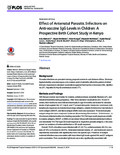Effect of antenatal parasitic infections on anti-vaccine IgG levels in children: a prospective birth cohort study in Kenya

View/
Date
2015Author
Malhotra, Indu
McKibben, Maxim
Mungai, Peter {et al}
Metadata
Show full item recordAbstract
Parasitic infections are prevalent among pregnant women in sub-Saharan Africa. We investigated whether prenatal exposure to malaria and/or helminths affects the pattern of infant immune responses to standard vaccinations against Haemophilus influenzae (Hib), diphtheria (DT), hepatitis B (Hep B) and tetanus toxoid (TT). 450 Kenyan women were tested for malaria, schistosomiasis, lymphatic filariasis (LF), and intestinal helminths during pregnancy. After three standard vaccinations at 6, 10 and 14weeks, their newborns were followed biannually to age 36 months and tested for absolute
levels of IgG against Hib, DT, Hep B, and TT at each time point. Newborns’ cord blood (CB) lymphocyte responses to malaria blood-stage antigens, soluble Schistosoma haematobium worm antigen (SWAP), and filaria antigen (BMA) were also assessed. Three immunophe-notype categories were compared: i) tolerant (those having Plasmodium-,Schistosoma
-, or Wuchereria-infected mothers but lacking respective Th1/Th2-type recall responses at birth to malaria antigens, SWAP, or BMA); ii)sensitized (those with infected/uninfected mothers and detectable Th1/Th2-type CB recall response to respective parasite antigen); or iii) unex-posed (no evidence of maternal infection or CB recall response).
Overall, 78.9% of mothers were infected with LF (44.7%), schistosomiasis (32.4%), malaria (27.6%) or hookworm (33.8%). Antenatal maternal malaria, LF, and hookworm were independently associated with significantly lower Hib-specific IgG. Presence of multiple maternal infections was associated with lower infant IgG levels against Hib and DT antigens post-vaccination. Post-vaccination IgG levels were also significantly associated with immunophenotype: malaria-tolerized infants had reduced response to DT, whereas filaria- tolerized infants showed reduced response to Hib.There is an impaired ability to develop IgG antibody responses to key protective antigens of Hib and diphtheria in infants of mothers infected with malaria and/or helminths during pregnancy. These findings highlight the importance of control and prevention of parasitic infections among pregnant women.
